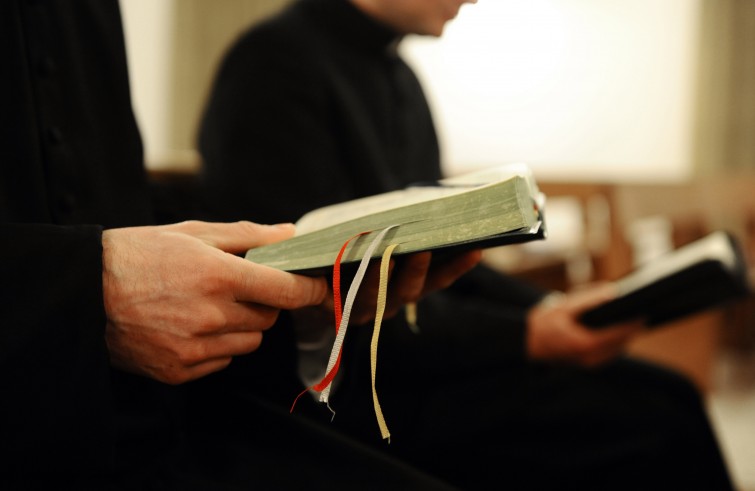
“The acute wound inflicted by the cases of abuse has raised deep questions inside the Church, which did not limit herself to ask forgiveness or compensate the victims. In fact, in adherence to her mission to be a sign of the love of God in the world, the Church’s concerns encompass listening to the victims and expressing her closeness and support.” Msgr. Jorge Carlos Patrón Wong, Secretary in charge of Seminaries of the Congregation for the Clergy, highlighted in clear terms the Church’s growing interest for formation and abuse prevention
Pope Francis has given a clear indication to religious Superiors: “Never receive to the religious life or to a diocese candidates that have been previously rejected from another seminary or from another Institute without asking for clear and detailed information on the motivations for their moving away.”
It should be remembered that in the same statement the Holy Father tells the religious: to “be careful in receiving formation candidates to the religious life without evaluating well their sufficient affective maturity.” This is the crucial point underlined in the new Ratio Fundamentalis, recently promulgated by the Congregation for the Clergy. The path of formation for the priesthood has amongst its primary objectives the achievement of a balanced, satisfactory degree of human, affective and psychological maturity. Obviously this attitude is not confined to abuse prevention as it encompasses the needs of living as a Shepherd along with the practice of the ministry. The Church needs priests capable of warming people’s hearts – the Pope recently said – that is, close, compassionate, inclined to listening and understanding, capable of establishing serene and authentic relations. Obviously this would be impossible without sufficient human maturity.
Which strategies could be adopted in seminaries to immediately identify those inclined to inflict serious crimes against minors?
First of all it is important to be extremely vigilant and adopt far-sighted discernment of the personal and vocational “history” of each candidate. The idea of the seminary understood as a mere “structure” that almost automatically leads the person to reach the goal of ordination, should be replaced by the awareness of being part of a formation community whose proposal envisages personal accompaniment. It is aimed at strengthening vocational desires, but first of all, at enabling seminarians to be in touch with their path of life, so they may become aware of their own weaknesses and dark sides, thereby facing, if need be, the problems linked to the emotional and affective sphere. Secondly, it is necessary to educate and inform seminarians on this issue, mindful of the laws and cultures of their Countries of origin; thirdly
If alarming signals or aspects should be detected during the path of accompaniment, the candidates should honestly interrupt the process, and if it shouldn’t happen, those responsible for their formation are called to intervene immediately and firmly.

While the guidelines of priestly formation already envisage all the necessary aspects –meetings with those responsible for formation, involvement of psychologists and psychiatrists through tests, interviews, etc – why is it still so hard to eliminate the scourge of child abuse?
Unfortunately, as we know, the deep roots of such a seriously deviant behaviour – as reconfirmed by psychological studies – are not easy to identify. Just to give an example, people who were victims of abuse could in turn have an incontrollable drive to inflict that same abuse on others. That’s why the path of formation must delve deep down, starting with the personal story of the candidates. It wish to point out that Church is deeply saddened by the issue of abuses and, especially in the past few years, she has been increasing related initiatives and reflections, not only for the establishment of justice for the victims, but also – and even more so – to boost awareness on the gravity of this evil deed and prevent further cases of abuse. But obviously, as often happens, when we confront the mystery of evil, a determined will and the use of the appropriate tools may not be enough. What is most important ,
Is to never lower our guard, and work together to eradicate this horror once and for all.
On several occasions the Church has been accused of holding an attitude of self-defence, of not admitting the seriousness of the crimes or of hiding the offenders.
One should always be cautious when passing judgement. There have been cases in which the facts were evaluated too superficially or of cover-ups motivated by fear. But on other occasions these tragic situations were not appropriately evaluated or failed to come to fore in all their magnitude. There is no doubt that omitting to report such a crime is a grave deed. Upon his return from the United States Pope Francis said: These things must not be covered up; and those who covered them up are also guilty!
On this aspect the line of the Holy See is very clear and it should be said that the Church is concerned not so much and not only about the possibility that her image may be tainted, but most of all that inside the Church nothing will happen that could hurt her sons and daughters, in particular those who are most weak.
Could the victims of abuse be more involved?
Priestly formation, according to the vision of the new Ratio, seeks for form enlightened Shepherds, capable of listening, of closeness and compassion; capable of exercising spiritual fatherhood, full of tenderness and mercy. Hence the major challenge will be to prepare Shepherds capable of welcoming and listening to the victims of abuse, endowed with those human and spiritual virtues enabling them to offer accompaniment, consolation and strength, to those who have been so deeply scarred.

Does the inappropriate use of the media and social networks pose a danger?
We should not reason in terms of “dangers.” God has come into the flesh of mankind and in history to welcome our reality and transfigure its shadows. We too who are in this world and use its tools, but we are called to do so in a responsible manner, starting from our relationship with God and our adherence to the Gospel. It certainly is an ambivalent realm. However – as the Pope has reminded the Community of “La Civiltà Cattolica” and the priests and religious gathered in Milan – we should not be afraid of facing challenges. In fact, we should teach a sound and sober use of the media and social networks, seizing the opportunities they offer to develop interpersonal relations, and especially for evangelization.
Sincere vigilance at personal and community level is needed, in addition to continuing evaluation.
What indications does the Holy See give to seminarians, at a time of a drop in vocations? Could some be tempted to be less rigorous in the candidates’ evaluation for the sake of having higher numbers of priests? To this regard Evangelii gaudium states in clear words: “Despite the scarcity of vocations, today we are increasingly aware of the need for a better process of selecting candidates to the priesthood.” (EG, n. 107). On several occasions the Holy Father has called for a serious, rigorous discernment in the selection of candidates. The fact of being a “minority Church” – as Pope Francis reminded us during his recent visit to Milan – should not raise concerns, as we are called to be the yeast and salt for the world. We should devote all our best ecclesial energies to the pastoral care of vocations, spreading the joy of the Gospel amongst youths, offering them our time and resources so they may be listened to deeply and guided in their discernment, and perhaps, showing them that following the Lord along the path of a special consecration is a special possibility of a full and joyful life. As for the rest, we must let the Holy Spirit act in its own time and manner, cultivating Christian hope in us and in others, along with the certainty that God keeps His promises.










